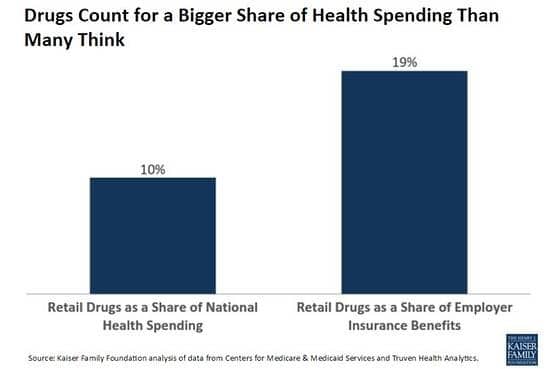It’s certainly no surprise to Medicare beneficiaries that America’s prescription drug industry continues to take a growing share of the average American’s health care costs. A new survey by Kaiser Family Foundation shows drug expenses actually takes an even bigger bite than experts previously thought.
“High drug prices have been in the news because of costly drugs to treat Hepatitis C, among other illnesses, and because elected officials and political candidates have been talking about drug costs. Rising drug prices, expanded coverage of the uninsured under the Affordable Care Act, and an improving economy have also contributed to an uptick in the rate of increase in health spending. But depending on what you count and how you count, drug spending may be an even larger problem than many thought. It clearly is for employers, who foot a large share of the nation’s health-care bills.”…Drew Altman, Kaiser Family Foundation

The Senate Special Committee on Aging has launched an investigation into recent cases in which pharmaceutical companies acquired a decades-old drug and then increased the price significantly.
The committee singled out four companies: Turing, Valeant, Rodelis and Retrophin. USA Today detailed some of the outrageous price hikes and their impact on Americans who needed life-saving prescription drugs:
Spiraling costs for two heart drugs owned by drugmaker Valeant Pharmacueticals International increased the Cleveland Clinic’s total drug budget by $8.6 million, hearing testimony showed.
North Carolina doctors treating a baby for toxoplasmosis were unable to get the Daraprim medication that targets the parasitic disease because Turing Pharmaceuticals had raised the price 40 times beyond its original cost. The doctors instead had to use an alternative medication.
Erin Fox, director of the drug information service at the University of Utah Health System, testified that a price hike from $440 to $2,700 forced her to keep a Valeant heart drug locked up after removing it from medication carts where it previously had been available.
Sen. Claire McCaskill, D-Mo., the committee’s ranking minority member, said the committee’s continuing investigation had found a pharmaceutical industry “market failure.”
“And when there’s a market failure, the government has a role in addressing it,” said McCaskill.
In Medicare’s case, the government also has the ability to address the high costs of prescription drugs, saving the program and seniors money. One simple solution is to allow Medicare to negotiate prices for prescription drugs which could save the program and its beneficiaries billions of dollars.
“The law that established Medicare Part D explicitly prohibits the prescription drug program from negotiating lower drug costs for beneficiaries. The major pharmaceutical companies adamantly defend this rule, contending that the higher prices are necessary to support the industry’s investment in research and development. However, a comparison of the prices paid by Part D with those paid by the Department of Veterans Affairs (VA) and other agencies shows that Part D could save billions of dollars through the use of additional negotiation techniques. Our analysis finds that the VA attains drug prices that, on average, are 48 percent lower than Part D plan prices for the top 10 drugs covered by the program.” …”Price Negotiation for the Medicare Drug Program: It is Time to Lower Costs for Seniors,” NCPSSM Issue Brief


